Power of Police in Stopping and Searching: Criminology Report
VerifiedAdded on 2023/01/16
|9
|2669
|73
AI Summary
This report explores the power of the police in stopping and searching individuals, examining the aspects of the criminal justice system and the criteria used by the police. It discusses the strategies used by the police to collect information and handle criminal cases, as well as the challenges faced in gathering relevant data. The report also delves into the statutory laws and acts that grant the police these powers, such as the Police and Criminal Evidence Act and the Terrorism Act. Overall, it highlights the importance of balancing police powers with individual rights.
Contribute Materials
Your contribution can guide someone’s learning journey. Share your
documents today.
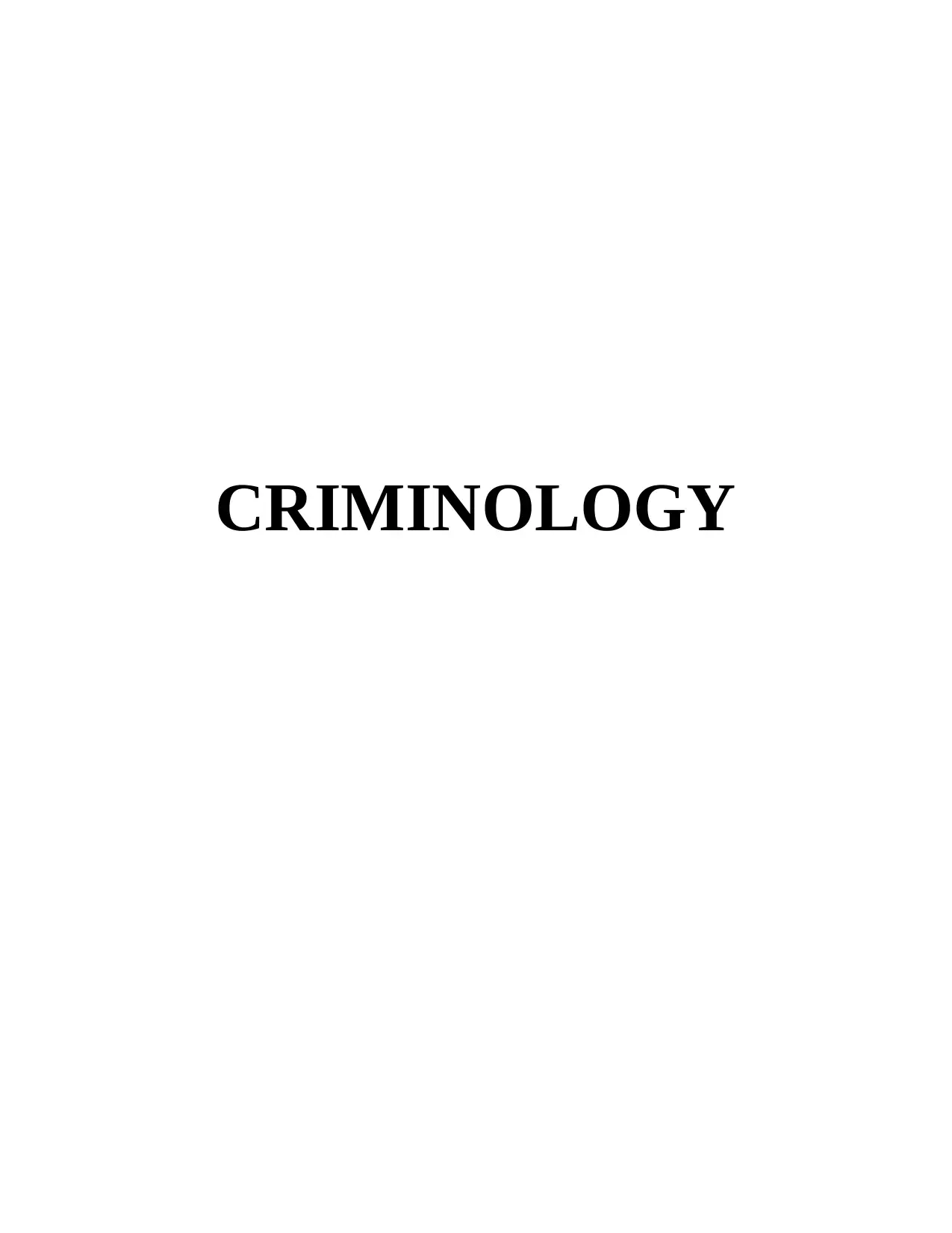
CRIMINOLOGY
Secure Best Marks with AI Grader
Need help grading? Try our AI Grader for instant feedback on your assignments.

Contents
A).....................................................................................................................................................4
B).....................................................................................................................................................4
REFERENCES..............................................................................................................................10
A).....................................................................................................................................................4
B).....................................................................................................................................................4
REFERENCES..............................................................................................................................10

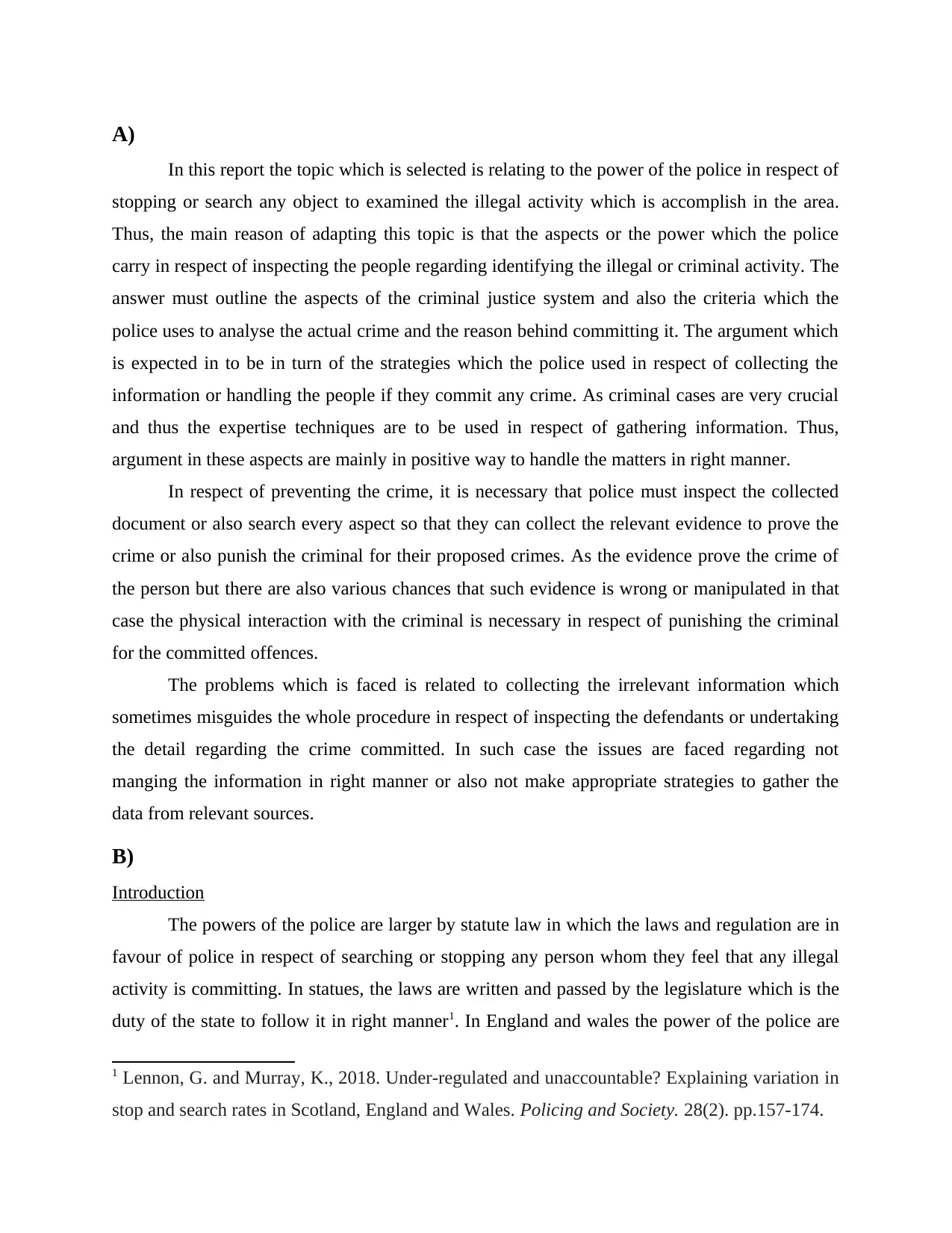
A)
In this report the topic which is selected is relating to the power of the police in respect of
stopping or search any object to examined the illegal activity which is accomplish in the area.
Thus, the main reason of adapting this topic is that the aspects or the power which the police
carry in respect of inspecting the people regarding identifying the illegal or criminal activity. The
answer must outline the aspects of the criminal justice system and also the criteria which the
police uses to analyse the actual crime and the reason behind committing it. The argument which
is expected in to be in turn of the strategies which the police used in respect of collecting the
information or handling the people if they commit any crime. As criminal cases are very crucial
and thus the expertise techniques are to be used in respect of gathering information. Thus,
argument in these aspects are mainly in positive way to handle the matters in right manner.
In respect of preventing the crime, it is necessary that police must inspect the collected
document or also search every aspect so that they can collect the relevant evidence to prove the
crime or also punish the criminal for their proposed crimes. As the evidence prove the crime of
the person but there are also various chances that such evidence is wrong or manipulated in that
case the physical interaction with the criminal is necessary in respect of punishing the criminal
for the committed offences.
The problems which is faced is related to collecting the irrelevant information which
sometimes misguides the whole procedure in respect of inspecting the defendants or undertaking
the detail regarding the crime committed. In such case the issues are faced regarding not
manging the information in right manner or also not make appropriate strategies to gather the
data from relevant sources.
B)
Introduction
The powers of the police are larger by statute law in which the laws and regulation are in
favour of police in respect of searching or stopping any person whom they feel that any illegal
activity is committing. In statues, the laws are written and passed by the legislature which is the
duty of the state to follow it in right manner1. In England and wales the power of the police are
1 Lennon, G. and Murray, K., 2018. Under-regulated and unaccountable? Explaining variation in
stop and search rates in Scotland, England and Wales. Policing and Society. 28(2). pp.157-174.
In this report the topic which is selected is relating to the power of the police in respect of
stopping or search any object to examined the illegal activity which is accomplish in the area.
Thus, the main reason of adapting this topic is that the aspects or the power which the police
carry in respect of inspecting the people regarding identifying the illegal or criminal activity. The
answer must outline the aspects of the criminal justice system and also the criteria which the
police uses to analyse the actual crime and the reason behind committing it. The argument which
is expected in to be in turn of the strategies which the police used in respect of collecting the
information or handling the people if they commit any crime. As criminal cases are very crucial
and thus the expertise techniques are to be used in respect of gathering information. Thus,
argument in these aspects are mainly in positive way to handle the matters in right manner.
In respect of preventing the crime, it is necessary that police must inspect the collected
document or also search every aspect so that they can collect the relevant evidence to prove the
crime or also punish the criminal for their proposed crimes. As the evidence prove the crime of
the person but there are also various chances that such evidence is wrong or manipulated in that
case the physical interaction with the criminal is necessary in respect of punishing the criminal
for the committed offences.
The problems which is faced is related to collecting the irrelevant information which
sometimes misguides the whole procedure in respect of inspecting the defendants or undertaking
the detail regarding the crime committed. In such case the issues are faced regarding not
manging the information in right manner or also not make appropriate strategies to gather the
data from relevant sources.
B)
Introduction
The powers of the police are larger by statute law in which the laws and regulation are in
favour of police in respect of searching or stopping any person whom they feel that any illegal
activity is committing. In statues, the laws are written and passed by the legislature which is the
duty of the state to follow it in right manner1. In England and wales the power of the police are
1 Lennon, G. and Murray, K., 2018. Under-regulated and unaccountable? Explaining variation in
stop and search rates in Scotland, England and Wales. Policing and Society. 28(2). pp.157-174.
Secure Best Marks with AI Grader
Need help grading? Try our AI Grader for instant feedback on your assignments.
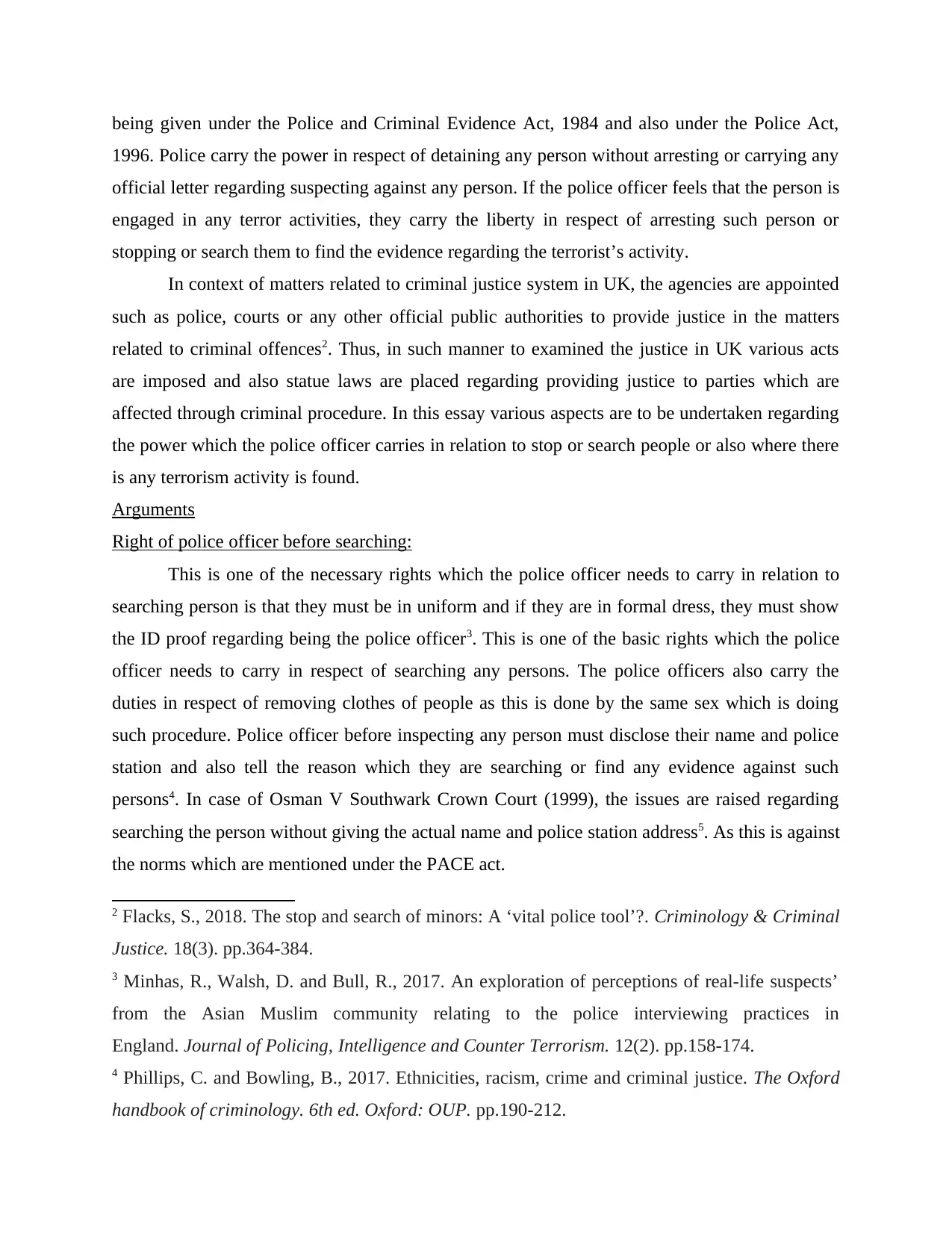
being given under the Police and Criminal Evidence Act, 1984 and also under the Police Act,
1996. Police carry the power in respect of detaining any person without arresting or carrying any
official letter regarding suspecting against any person. If the police officer feels that the person is
engaged in any terror activities, they carry the liberty in respect of arresting such person or
stopping or search them to find the evidence regarding the terrorist’s activity.
In context of matters related to criminal justice system in UK, the agencies are appointed
such as police, courts or any other official public authorities to provide justice in the matters
related to criminal offences2. Thus, in such manner to examined the justice in UK various acts
are imposed and also statue laws are placed regarding providing justice to parties which are
affected through criminal procedure. In this essay various aspects are to be undertaken regarding
the power which the police officer carries in relation to stop or search people or also where there
is any terrorism activity is found.
Arguments
Right of police officer before searching:
This is one of the necessary rights which the police officer needs to carry in relation to
searching person is that they must be in uniform and if they are in formal dress, they must show
the ID proof regarding being the police officer3. This is one of the basic rights which the police
officer needs to carry in respect of searching any persons. The police officers also carry the
duties in respect of removing clothes of people as this is done by the same sex which is doing
such procedure. Police officer before inspecting any person must disclose their name and police
station and also tell the reason which they are searching or find any evidence against such
persons4. In case of Osman V Southwark Crown Court (1999), the issues are raised regarding
searching the person without giving the actual name and police station address5. As this is against
the norms which are mentioned under the PACE act.
2 Flacks, S., 2018. The stop and search of minors: A ‘vital police tool’?. Criminology & Criminal
Justice. 18(3). pp.364-384.
3 Minhas, R., Walsh, D. and Bull, R., 2017. An exploration of perceptions of real-life suspects’
from the Asian Muslim community relating to the police interviewing practices in
England. Journal of Policing, Intelligence and Counter Terrorism. 12(2). pp.158-174.
4 Phillips, C. and Bowling, B., 2017. Ethnicities, racism, crime and criminal justice. The Oxford
handbook of criminology. 6th ed. Oxford: OUP. pp.190-212.
1996. Police carry the power in respect of detaining any person without arresting or carrying any
official letter regarding suspecting against any person. If the police officer feels that the person is
engaged in any terror activities, they carry the liberty in respect of arresting such person or
stopping or search them to find the evidence regarding the terrorist’s activity.
In context of matters related to criminal justice system in UK, the agencies are appointed
such as police, courts or any other official public authorities to provide justice in the matters
related to criminal offences2. Thus, in such manner to examined the justice in UK various acts
are imposed and also statue laws are placed regarding providing justice to parties which are
affected through criminal procedure. In this essay various aspects are to be undertaken regarding
the power which the police officer carries in relation to stop or search people or also where there
is any terrorism activity is found.
Arguments
Right of police officer before searching:
This is one of the necessary rights which the police officer needs to carry in relation to
searching person is that they must be in uniform and if they are in formal dress, they must show
the ID proof regarding being the police officer3. This is one of the basic rights which the police
officer needs to carry in respect of searching any persons. The police officers also carry the
duties in respect of removing clothes of people as this is done by the same sex which is doing
such procedure. Police officer before inspecting any person must disclose their name and police
station and also tell the reason which they are searching or find any evidence against such
persons4. In case of Osman V Southwark Crown Court (1999), the issues are raised regarding
searching the person without giving the actual name and police station address5. As this is against
the norms which are mentioned under the PACE act.
2 Flacks, S., 2018. The stop and search of minors: A ‘vital police tool’?. Criminology & Criminal
Justice. 18(3). pp.364-384.
3 Minhas, R., Walsh, D. and Bull, R., 2017. An exploration of perceptions of real-life suspects’
from the Asian Muslim community relating to the police interviewing practices in
England. Journal of Policing, Intelligence and Counter Terrorism. 12(2). pp.158-174.
4 Phillips, C. and Bowling, B., 2017. Ethnicities, racism, crime and criminal justice. The Oxford
handbook of criminology. 6th ed. Oxford: OUP. pp.190-212.
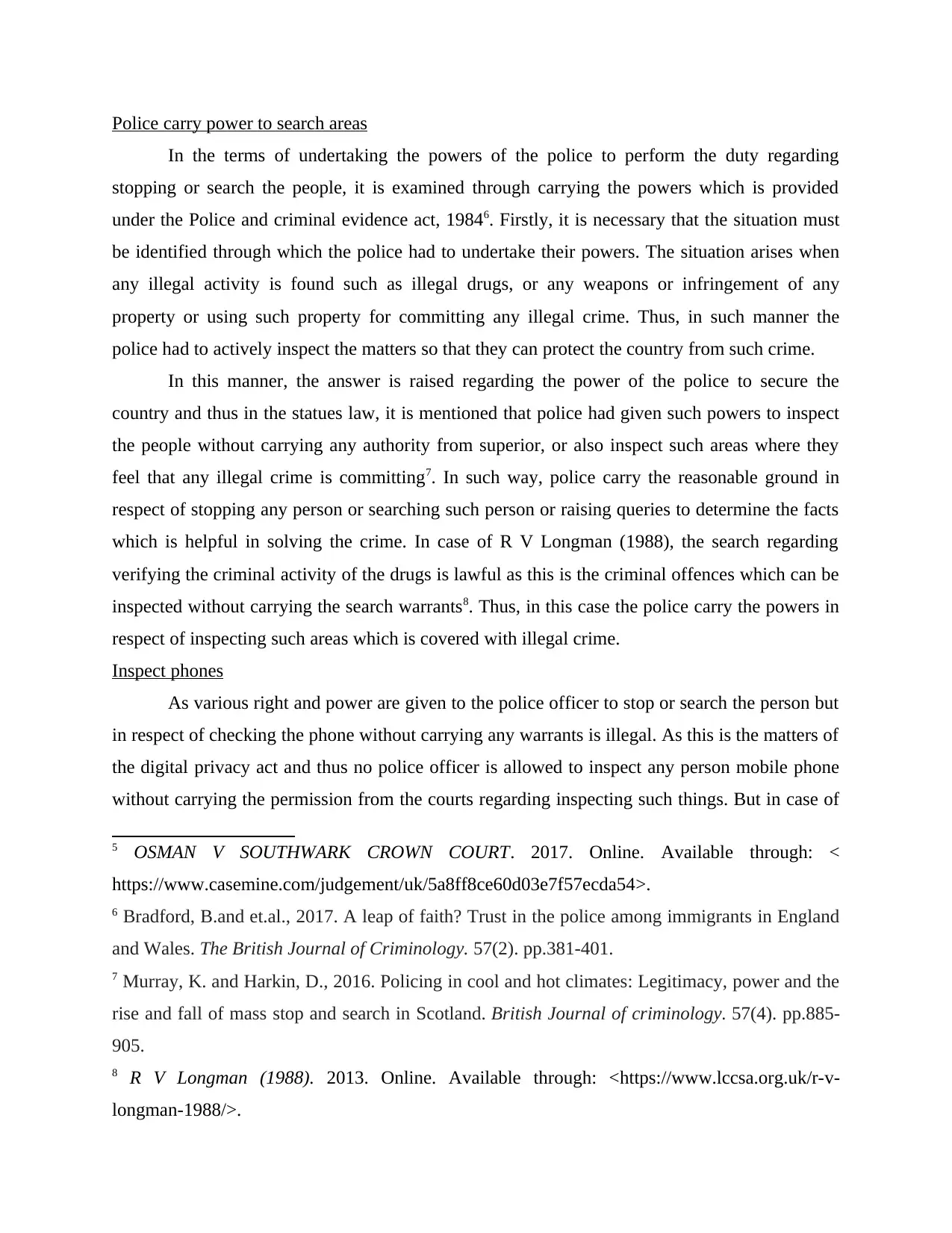
Police carry power to search areas
In the terms of undertaking the powers of the police to perform the duty regarding
stopping or search the people, it is examined through carrying the powers which is provided
under the Police and criminal evidence act, 19846. Firstly, it is necessary that the situation must
be identified through which the police had to undertake their powers. The situation arises when
any illegal activity is found such as illegal drugs, or any weapons or infringement of any
property or using such property for committing any illegal crime. Thus, in such manner the
police had to actively inspect the matters so that they can protect the country from such crime.
In this manner, the answer is raised regarding the power of the police to secure the
country and thus in the statues law, it is mentioned that police had given such powers to inspect
the people without carrying any authority from superior, or also inspect such areas where they
feel that any illegal crime is committing7. In such way, police carry the reasonable ground in
respect of stopping any person or searching such person or raising queries to determine the facts
which is helpful in solving the crime. In case of R V Longman (1988), the search regarding
verifying the criminal activity of the drugs is lawful as this is the criminal offences which can be
inspected without carrying the search warrants8. Thus, in this case the police carry the powers in
respect of inspecting such areas which is covered with illegal crime.
Inspect phones
As various right and power are given to the police officer to stop or search the person but
in respect of checking the phone without carrying any warrants is illegal. As this is the matters of
the digital privacy act and thus no police officer is allowed to inspect any person mobile phone
without carrying the permission from the courts regarding inspecting such things. But in case of
5 OSMAN V SOUTHWARK CROWN COURT. 2017. Online. Available through: <
https://www.casemine.com/judgement/uk/5a8ff8ce60d03e7f57ecda54>.
6 Bradford, B.and et.al., 2017. A leap of faith? Trust in the police among immigrants in England
and Wales. The British Journal of Criminology. 57(2). pp.381-401.
7 Murray, K. and Harkin, D., 2016. Policing in cool and hot climates: Legitimacy, power and the
rise and fall of mass stop and search in Scotland. British Journal of criminology. 57(4). pp.885-
905.
8 R V Longman (1988). 2013. Online. Available through: <https://www.lccsa.org.uk/r-v-
longman-1988/>.
In the terms of undertaking the powers of the police to perform the duty regarding
stopping or search the people, it is examined through carrying the powers which is provided
under the Police and criminal evidence act, 19846. Firstly, it is necessary that the situation must
be identified through which the police had to undertake their powers. The situation arises when
any illegal activity is found such as illegal drugs, or any weapons or infringement of any
property or using such property for committing any illegal crime. Thus, in such manner the
police had to actively inspect the matters so that they can protect the country from such crime.
In this manner, the answer is raised regarding the power of the police to secure the
country and thus in the statues law, it is mentioned that police had given such powers to inspect
the people without carrying any authority from superior, or also inspect such areas where they
feel that any illegal crime is committing7. In such way, police carry the reasonable ground in
respect of stopping any person or searching such person or raising queries to determine the facts
which is helpful in solving the crime. In case of R V Longman (1988), the search regarding
verifying the criminal activity of the drugs is lawful as this is the criminal offences which can be
inspected without carrying the search warrants8. Thus, in this case the police carry the powers in
respect of inspecting such areas which is covered with illegal crime.
Inspect phones
As various right and power are given to the police officer to stop or search the person but
in respect of checking the phone without carrying any warrants is illegal. As this is the matters of
the digital privacy act and thus no police officer is allowed to inspect any person mobile phone
without carrying the permission from the courts regarding inspecting such things. But in case of
5 OSMAN V SOUTHWARK CROWN COURT. 2017. Online. Available through: <
https://www.casemine.com/judgement/uk/5a8ff8ce60d03e7f57ecda54>.
6 Bradford, B.and et.al., 2017. A leap of faith? Trust in the police among immigrants in England
and Wales. The British Journal of Criminology. 57(2). pp.381-401.
7 Murray, K. and Harkin, D., 2016. Policing in cool and hot climates: Legitimacy, power and the
rise and fall of mass stop and search in Scotland. British Journal of criminology. 57(4). pp.885-
905.
8 R V Longman (1988). 2013. Online. Available through: <https://www.lccsa.org.uk/r-v-
longman-1988/>.
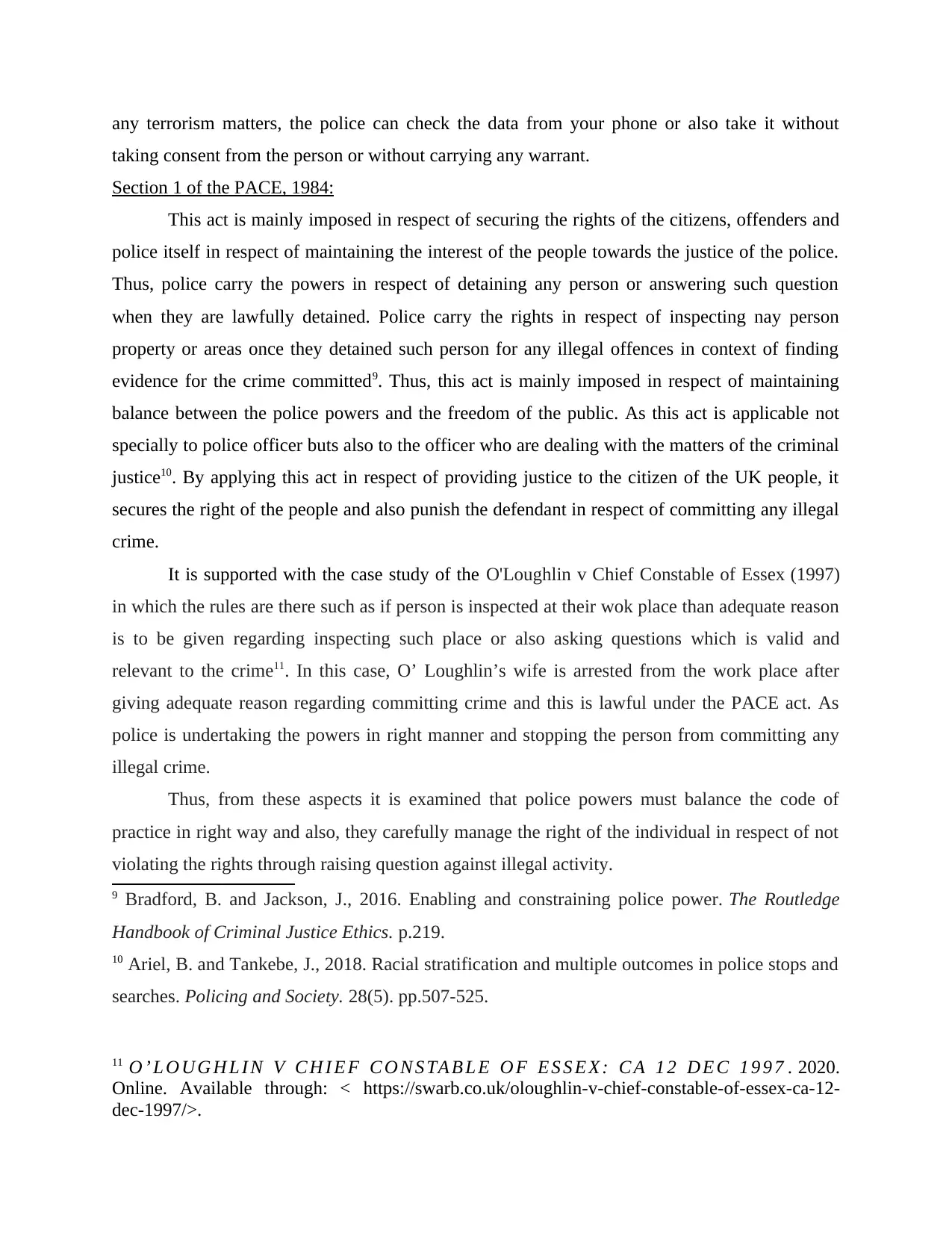
any terrorism matters, the police can check the data from your phone or also take it without
taking consent from the person or without carrying any warrant.
Section 1 of the PACE, 1984:
This act is mainly imposed in respect of securing the rights of the citizens, offenders and
police itself in respect of maintaining the interest of the people towards the justice of the police.
Thus, police carry the powers in respect of detaining any person or answering such question
when they are lawfully detained. Police carry the rights in respect of inspecting nay person
property or areas once they detained such person for any illegal offences in context of finding
evidence for the crime committed9. Thus, this act is mainly imposed in respect of maintaining
balance between the police powers and the freedom of the public. As this act is applicable not
specially to police officer buts also to the officer who are dealing with the matters of the criminal
justice10. By applying this act in respect of providing justice to the citizen of the UK people, it
secures the right of the people and also punish the defendant in respect of committing any illegal
crime.
It is supported with the case study of the O'Loughlin v Chief Constable of Essex (1997)
in which the rules are there such as if person is inspected at their wok place than adequate reason
is to be given regarding inspecting such place or also asking questions which is valid and
relevant to the crime11. In this case, O’ Loughlin’s wife is arrested from the work place after
giving adequate reason regarding committing crime and this is lawful under the PACE act. As
police is undertaking the powers in right manner and stopping the person from committing any
illegal crime.
Thus, from these aspects it is examined that police powers must balance the code of
practice in right way and also, they carefully manage the right of the individual in respect of not
violating the rights through raising question against illegal activity.
9 Bradford, B. and Jackson, J., 2016. Enabling and constraining police power. The Routledge
Handbook of Criminal Justice Ethics. p.219.
10 Ariel, B. and Tankebe, J., 2018. Racial stratification and multiple outcomes in police stops and
searches. Policing and Society. 28(5). pp.507-525.
11 O ’ L O U G H L I N V C H I E F C O N S TA B L E O F E S S E X : C A 1 2 D E C 1 9 9 7 . 2020.
Online. Available through: < https://swarb.co.uk/oloughlin-v-chief-constable-of-essex-ca-12-
dec-1997/>.
taking consent from the person or without carrying any warrant.
Section 1 of the PACE, 1984:
This act is mainly imposed in respect of securing the rights of the citizens, offenders and
police itself in respect of maintaining the interest of the people towards the justice of the police.
Thus, police carry the powers in respect of detaining any person or answering such question
when they are lawfully detained. Police carry the rights in respect of inspecting nay person
property or areas once they detained such person for any illegal offences in context of finding
evidence for the crime committed9. Thus, this act is mainly imposed in respect of maintaining
balance between the police powers and the freedom of the public. As this act is applicable not
specially to police officer buts also to the officer who are dealing with the matters of the criminal
justice10. By applying this act in respect of providing justice to the citizen of the UK people, it
secures the right of the people and also punish the defendant in respect of committing any illegal
crime.
It is supported with the case study of the O'Loughlin v Chief Constable of Essex (1997)
in which the rules are there such as if person is inspected at their wok place than adequate reason
is to be given regarding inspecting such place or also asking questions which is valid and
relevant to the crime11. In this case, O’ Loughlin’s wife is arrested from the work place after
giving adequate reason regarding committing crime and this is lawful under the PACE act. As
police is undertaking the powers in right manner and stopping the person from committing any
illegal crime.
Thus, from these aspects it is examined that police powers must balance the code of
practice in right way and also, they carefully manage the right of the individual in respect of not
violating the rights through raising question against illegal activity.
9 Bradford, B. and Jackson, J., 2016. Enabling and constraining police power. The Routledge
Handbook of Criminal Justice Ethics. p.219.
10 Ariel, B. and Tankebe, J., 2018. Racial stratification and multiple outcomes in police stops and
searches. Policing and Society. 28(5). pp.507-525.
11 O ’ L O U G H L I N V C H I E F C O N S TA B L E O F E S S E X : C A 1 2 D E C 1 9 9 7 . 2020.
Online. Available through: < https://swarb.co.uk/oloughlin-v-chief-constable-of-essex-ca-12-
dec-1997/>.
Paraphrase This Document
Need a fresh take? Get an instant paraphrase of this document with our AI Paraphraser
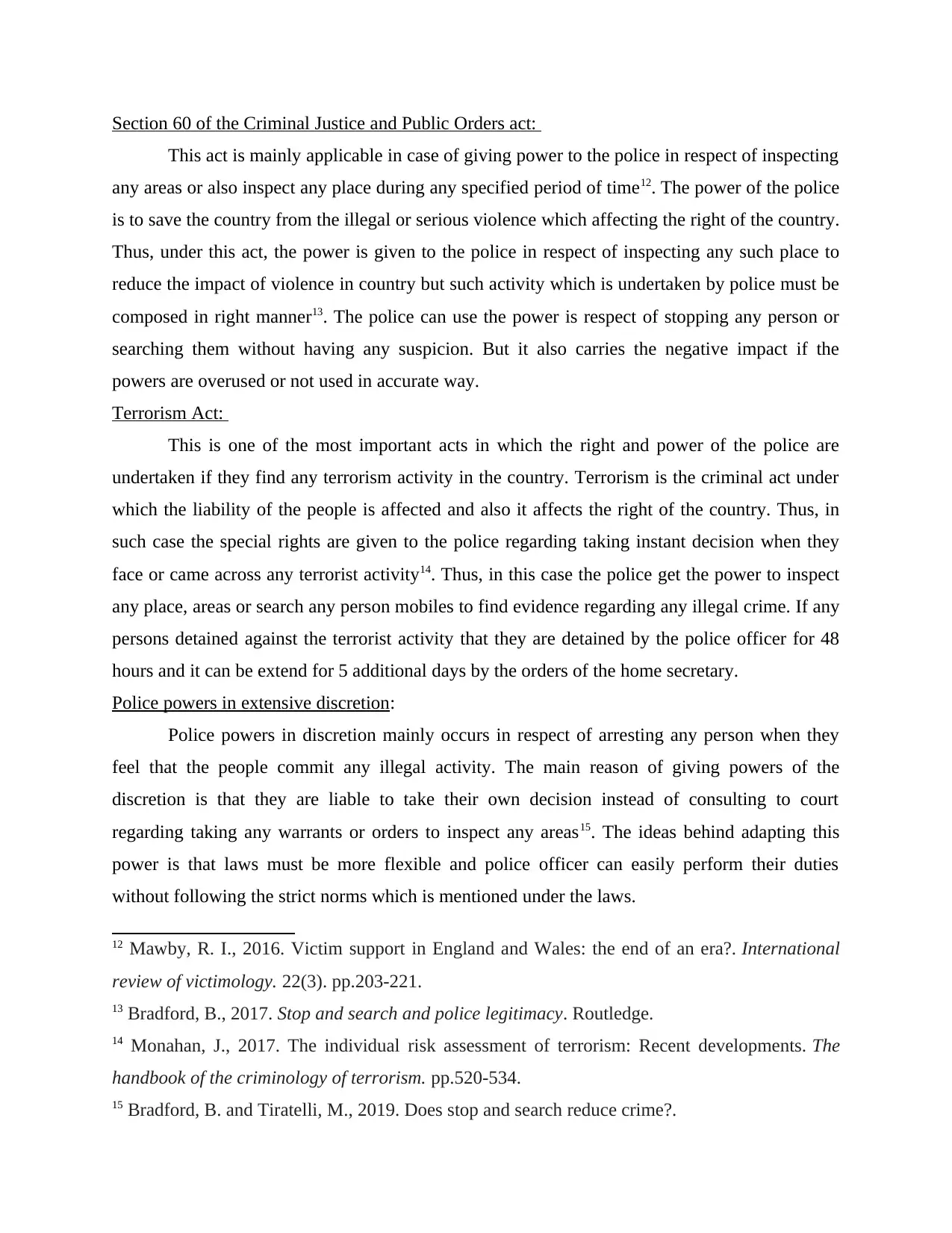
Section 60 of the Criminal Justice and Public Orders act:
This act is mainly applicable in case of giving power to the police in respect of inspecting
any areas or also inspect any place during any specified period of time12. The power of the police
is to save the country from the illegal or serious violence which affecting the right of the country.
Thus, under this act, the power is given to the police in respect of inspecting any such place to
reduce the impact of violence in country but such activity which is undertaken by police must be
composed in right manner13. The police can use the power is respect of stopping any person or
searching them without having any suspicion. But it also carries the negative impact if the
powers are overused or not used in accurate way.
Terrorism Act:
This is one of the most important acts in which the right and power of the police are
undertaken if they find any terrorism activity in the country. Terrorism is the criminal act under
which the liability of the people is affected and also it affects the right of the country. Thus, in
such case the special rights are given to the police regarding taking instant decision when they
face or came across any terrorist activity14. Thus, in this case the police get the power to inspect
any place, areas or search any person mobiles to find evidence regarding any illegal crime. If any
persons detained against the terrorist activity that they are detained by the police officer for 48
hours and it can be extend for 5 additional days by the orders of the home secretary.
Police powers in extensive discretion:
Police powers in discretion mainly occurs in respect of arresting any person when they
feel that the people commit any illegal activity. The main reason of giving powers of the
discretion is that they are liable to take their own decision instead of consulting to court
regarding taking any warrants or orders to inspect any areas15. The ideas behind adapting this
power is that laws must be more flexible and police officer can easily perform their duties
without following the strict norms which is mentioned under the laws.
12 Mawby, R. I., 2016. Victim support in England and Wales: the end of an era?. International
review of victimology. 22(3). pp.203-221.
13 Bradford, B., 2017. Stop and search and police legitimacy. Routledge.
14 Monahan, J., 2017. The individual risk assessment of terrorism: Recent developments. The
handbook of the criminology of terrorism. pp.520-534.
15 Bradford, B. and Tiratelli, M., 2019. Does stop and search reduce crime?.
This act is mainly applicable in case of giving power to the police in respect of inspecting
any areas or also inspect any place during any specified period of time12. The power of the police
is to save the country from the illegal or serious violence which affecting the right of the country.
Thus, under this act, the power is given to the police in respect of inspecting any such place to
reduce the impact of violence in country but such activity which is undertaken by police must be
composed in right manner13. The police can use the power is respect of stopping any person or
searching them without having any suspicion. But it also carries the negative impact if the
powers are overused or not used in accurate way.
Terrorism Act:
This is one of the most important acts in which the right and power of the police are
undertaken if they find any terrorism activity in the country. Terrorism is the criminal act under
which the liability of the people is affected and also it affects the right of the country. Thus, in
such case the special rights are given to the police regarding taking instant decision when they
face or came across any terrorist activity14. Thus, in this case the police get the power to inspect
any place, areas or search any person mobiles to find evidence regarding any illegal crime. If any
persons detained against the terrorist activity that they are detained by the police officer for 48
hours and it can be extend for 5 additional days by the orders of the home secretary.
Police powers in extensive discretion:
Police powers in discretion mainly occurs in respect of arresting any person when they
feel that the people commit any illegal activity. The main reason of giving powers of the
discretion is that they are liable to take their own decision instead of consulting to court
regarding taking any warrants or orders to inspect any areas15. The ideas behind adapting this
power is that laws must be more flexible and police officer can easily perform their duties
without following the strict norms which is mentioned under the laws.
12 Mawby, R. I., 2016. Victim support in England and Wales: the end of an era?. International
review of victimology. 22(3). pp.203-221.
13 Bradford, B., 2017. Stop and search and police legitimacy. Routledge.
14 Monahan, J., 2017. The individual risk assessment of terrorism: Recent developments. The
handbook of the criminology of terrorism. pp.520-534.
15 Bradford, B. and Tiratelli, M., 2019. Does stop and search reduce crime?.
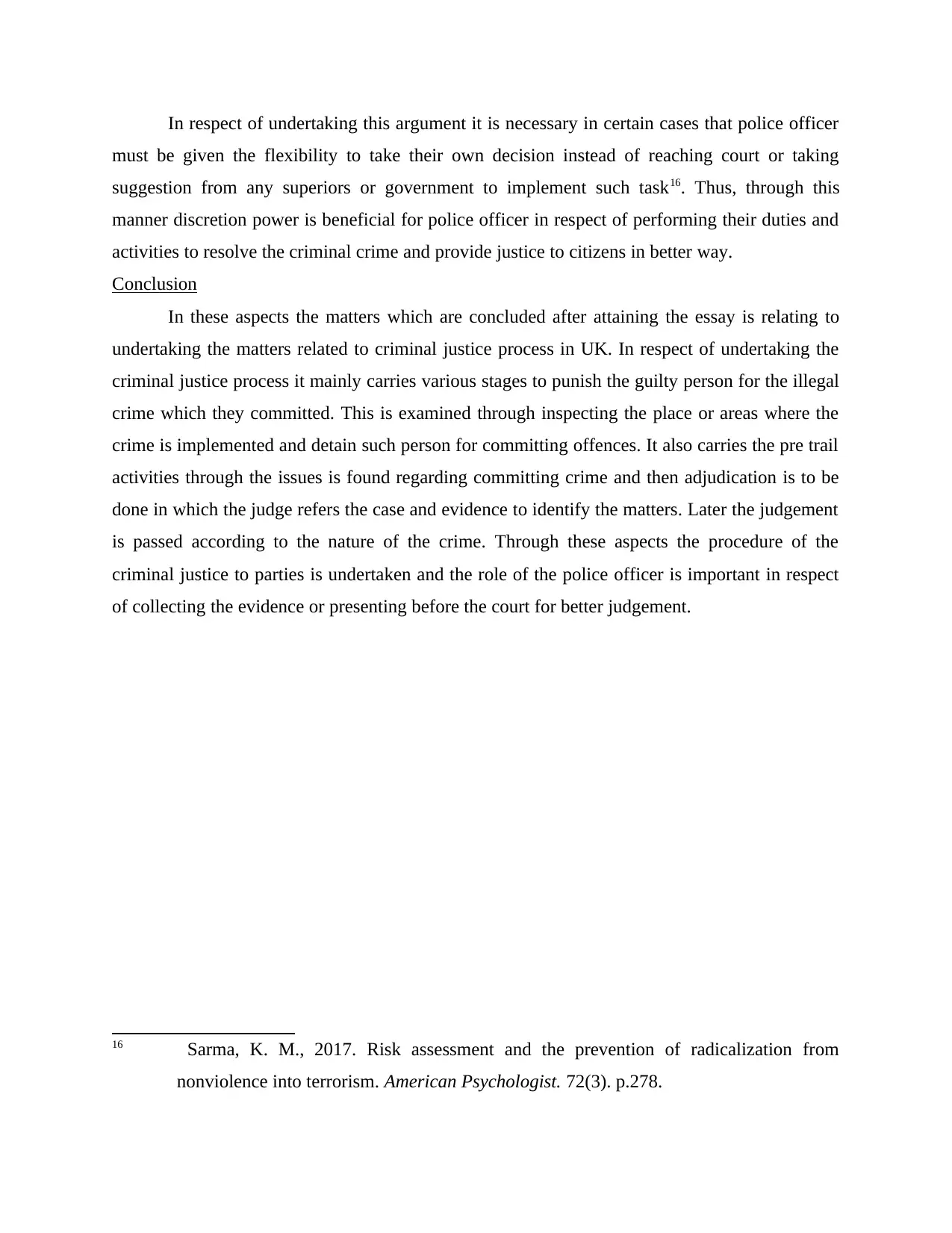
In respect of undertaking this argument it is necessary in certain cases that police officer
must be given the flexibility to take their own decision instead of reaching court or taking
suggestion from any superiors or government to implement such task16. Thus, through this
manner discretion power is beneficial for police officer in respect of performing their duties and
activities to resolve the criminal crime and provide justice to citizens in better way.
Conclusion
In these aspects the matters which are concluded after attaining the essay is relating to
undertaking the matters related to criminal justice process in UK. In respect of undertaking the
criminal justice process it mainly carries various stages to punish the guilty person for the illegal
crime which they committed. This is examined through inspecting the place or areas where the
crime is implemented and detain such person for committing offences. It also carries the pre trail
activities through the issues is found regarding committing crime and then adjudication is to be
done in which the judge refers the case and evidence to identify the matters. Later the judgement
is passed according to the nature of the crime. Through these aspects the procedure of the
criminal justice to parties is undertaken and the role of the police officer is important in respect
of collecting the evidence or presenting before the court for better judgement.
16 Sarma, K. M., 2017. Risk assessment and the prevention of radicalization from
nonviolence into terrorism. American Psychologist. 72(3). p.278.
must be given the flexibility to take their own decision instead of reaching court or taking
suggestion from any superiors or government to implement such task16. Thus, through this
manner discretion power is beneficial for police officer in respect of performing their duties and
activities to resolve the criminal crime and provide justice to citizens in better way.
Conclusion
In these aspects the matters which are concluded after attaining the essay is relating to
undertaking the matters related to criminal justice process in UK. In respect of undertaking the
criminal justice process it mainly carries various stages to punish the guilty person for the illegal
crime which they committed. This is examined through inspecting the place or areas where the
crime is implemented and detain such person for committing offences. It also carries the pre trail
activities through the issues is found regarding committing crime and then adjudication is to be
done in which the judge refers the case and evidence to identify the matters. Later the judgement
is passed according to the nature of the crime. Through these aspects the procedure of the
criminal justice to parties is undertaken and the role of the police officer is important in respect
of collecting the evidence or presenting before the court for better judgement.
16 Sarma, K. M., 2017. Risk assessment and the prevention of radicalization from
nonviolence into terrorism. American Psychologist. 72(3). p.278.
1 out of 9
Related Documents
Your All-in-One AI-Powered Toolkit for Academic Success.
+13062052269
info@desklib.com
Available 24*7 on WhatsApp / Email
![[object Object]](/_next/static/media/star-bottom.7253800d.svg)
Unlock your academic potential
© 2024 | Zucol Services PVT LTD | All rights reserved.





